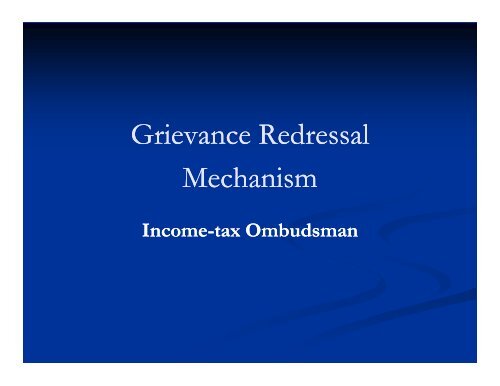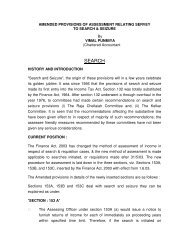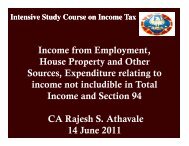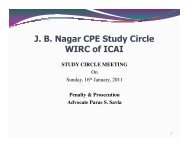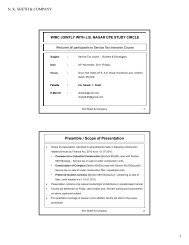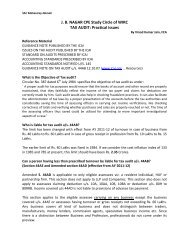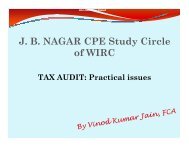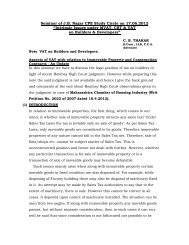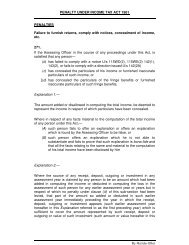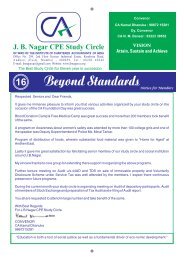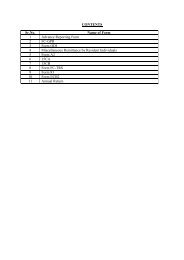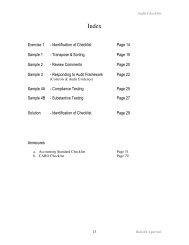Grievance Redressal Mechanism
Grievance Redressal Mechanism
Grievance Redressal Mechanism
- No tags were found...
Create successful ePaper yourself
Turn your PDF publications into a flip-book with our unique Google optimized e-Paper software.
<strong>Grievance</strong> <strong>Redressal</strong><strong>Mechanism</strong>Income-tax Ombudsman
Tax Payer Friendly steps taken byIncome-tax DeptComprehensive ComputerizationRefund Banker Scheme (RBS)Tax Return Preparer Scheme( TRPS)SevottamBulk returns- receiving & processing.Large Tax Payers Unit (LTU)Mass processing of Returns at Centralized Processing Centres).Business Process Re-engineering engineering (BPR)Income-tax WebsitesRSP & PRRTI
ORIGIN AND CURRENT STATUS OF OMBUDSMANThe Institution of Ombudsman is of Scandinavian origin. The Ombudsman enquires into grievancesor complaints against the functioning of a public authority. In our own country, the system ofOmbudsman has been introduced in the Banking sector, Insurance sector and in the Income-taxDepartment. A brief background as to the origin of institution of Ombudsman will be necessary atthis stage:Judiciary, Internal administrative checks by the Executive and the Legislators, has failed to exerciseadequate and effective control over the administration.In this scenario, the quest for an effective control-mechanism over the administration has led to thecreation of the Institution of Ombudsman in the Scandinavian countries. Sweden was the first countryto adopt this institution as early as in 1809. Finland adopted it in 1919; Denmark in 1953 and Norwayin 1963. New Zealand, Australia and U.K. have also established the Ombudsman system both at thecentre as well as at the States.The institutions have been adopted in all these countries with the basic idea to control effectively theactivities of, and prevent abuses by, public officials after it came to be realized that the existingprocedures and mechanism for the purpose were hardly adequate and efficacious. The British Ombudsman has interpreted the term ‘maladministration’’ in a broad sense as including“bias, neglect, inattention, delay, incompetence, ineptitude, perversity, turpitude, arbitrariness, andso on.” To these have also been added decisions “thoroughly bad in quality” or “clearly wrong”.On the whole, Ombudsman seeks to hold the balance between the citizen and the state and thuscontributes to the greater efficiency and humanity of the administrative process.The Ombudsman helps in removing the crisis of confidence between the administration and thepublic which otherwise could be the negation of good administration.
Ombudsman in Indian ConditionProcedures to redress individual complaints through the Courts or the Legislators or theadministration are as inadequate as any other common law countries. There is a peculiar elementpresent in the Indian situation which is not so much manifest elsewhere, viz. widespread publicsuspicion of administrative corruption which has very much undermined public confidence in theadministration and has very much corroded its moral authority and image.The Administrative Reforms Commission advocated the adoption of Ombudsman type ofInstitution in India.According to ARC, the redressal of citizens grievances is basic to thefunctioning of democratic governments, and will strengthen the hands of the government inadministering the laws of the land, its policies “without fear or favour, affection or ill-will,andenable it to go up in public faith and confidence without which progress would not be possible.With this objective, the ARC propounded a scheme for setting up an Ombudsman systemin India.However, due to various administrative and political reasons, the Ombudsmansystem as recommended by the ARC could not be created by the Government.In any case, there is a great need to supplement the existing mechanism to superviseadministration in India, and the experiment of the Ombudsman is worth a trial. It is hoped toresult in the improvement of administrative procedures affecting the individuals dealing withthe administration.
Ombudsman in Income-tax Dept.The Income Tax Ombudsman Guidelines, 2006, have been framed with the objective of enabling the resolution of complaintsrelating to public grievances against the Income-taxDepartment and to facilitate the satisfaction or settlement of suchcomplaints.Guidelines no.8 provides the powers and duties of the Ombudsman. The Ombudsman will mostly focus on administrativecomplaints and grievances relating to delays in disposal or settlement of claims connected with:Issue of refunds;Interest waiver petitions;Appeal effects;Rectification applications;Release of seized books of accounts and assets.In Guidelines 13, the Ombudsman is ordinarily expected to settle the tax payers grievance by agreement within a month ofthe filing of the complaint.This is one area where awareness need to be built-upup and there should be a genuine and focused effort to settle thegrievance within the time frame. Experience shows that this time limit has generally not been adhered to which can inviteadverse notice.Where a grievance cannot be settled by agreement, the Ombudsman has to mediate as required under the Guidelines. Ifresults do not emerge an award would have to be passed.Under Guidelines no.8(II)(e),Ombudsman is required to send a monthly report to the Chairman, CBDT and Secretary,Department of Revenue, recommending appropriate action against erring officials who fail to redress legitimate grievances.With greater awareness and sustained focused efforts, such cases of dereliction may be few and far.Under Guidelines 8(II)(g),the Ombudsman is to annually forward to the Board and to the CCITs, a list of awards made duringthe financial year against the official working in Mumbai Region so that the cognizance can be taken of the same whilewriting their Annual Confidential Reports. The number of cases where such notice would require to be taken may hopefullybe limited.
Purpose of this interactive session In Income Tax scenario, an attempt has beenmade to provide an overview of the Institutionof the Ombudsman in the context of tax payersfriendly initiatives taken by the Department togenerate awareness and to reduce tax burden. Awareness, involvement,co-operationoperationandcommitment to be responsive in our Endeavourfor redressal of grievances of tax payers.
Any Question/ Suggestions ?
Income-tax DepartmentOmbudsman, MumbaiThanks


